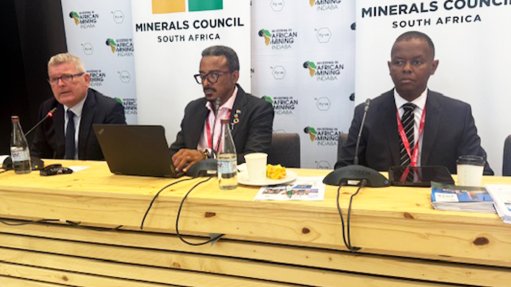Departments set to align BBBEE business practice regulations



PAUL FOUCHE Alignment is inevitable, as a clause has now been included in the amended BBBEE Act
LAMEEZE JEAN-PIERRE BBBEE in the mining industry is regulated by the amended broad-based socioeconomic empowerment charter for the South African mining and minerals industry
The Mining Charter is set to align with the Department of Trade and Industry’s Codes of Good Practice amendments, which come into effect on May 1, says law firm Fasken Martineau partner Paul Fouche.
He says the alignment is inevitable, as a clause has now been included in the amended Broad-Based Black Economic Empowerment (BBBEE) Act stipulating that the BBBEE Act will prevail over any other legislation that regulates BBBEE issues.
BBBEE in the mining industry is regulated by the amended broad-based socioeconomic empowerment charter for the South African mining and minerals industry (the Mining Charter), promulgated in 2010 in terms of the Mineral and Petroleum Resources Development Act, Fasken Martineau senior associate Lameeze Jean-Pierre tells Mining Weekly.
The Mining Charter is implemented by the Department of Mineral Resources (DMR) and sets the various targets that companies conducting mining activities need to comply with to demonstrate that transformation goals are being met.
The charter requires mining companies, when procuring goods and services from suppliers, to procure a minimum 40% of capital goods, 70% of services and 50% of consumer goods from black economic-empowerment (BEE) entities by 2014.
Therefore, to be competitive when securing business from mining companies, suppliers to the mining industry need to strive to be BEE entities, consequently achieving the 25% + 1 historically disadvantaged South Africans shareholding target.
Compliance with the BBBEE targets in the Mining Charter, which has, to date, functioned independently under the DMR, is a condition on which mining rights are issued to and retained by mining companies.
By contrast, in industries overseen by the DTI, BEE compliance is voluntary and usually stems from peer pressure, says Fouche.
“For example, if a company is competing for a State tender, BEE ratings are looked at as a criterion for competition,” he explains.
Further, he highlights that there are elements in the Mining Charter that are unique to the mining industry, such as housing, community development and sustainable development.
Meanwhile, the DTI’s generic scorecard in the revised codes contains five elements against which BBBEE compliance is assessed.
“The revised DTI codes identify priority elements, categorised by levels, including ownership, and enterprise and supplier development, which is related to procurement and skills development . . . [which] . . . companies must comply with [in order not to be] discounted under the DTI codes,” says Jean-Pierre.
In addition, employment equity, enterprise development and preferential procurement are no longer standalone elements on the scorecard.
The points required for each BBBEE status level in the revised codes have increased and it is, therefore, more onerous to achieve a favourable BBBEE rating.
“The criteria of the Mining Charter and the DTI codes are so different[that] categorising compliance using levels might not be possible,” adds Fouche.
However, Jean-Pierre notes that the DMR and the DTI are discussing the alignment of the two BBBEE systems to ensure standardisation.
If the alignment increases productivity, it has the potential to be a game changer for economic growth; however, the requirements are overwhelming to a degree, Fouche concludes.
Article Enquiry
Email Article
Save Article
Feedback
To advertise email advertising@creamermedia.co.za or click here
Press Office
Announcements
What's On
Subscribe to improve your user experience...
Option 1 (equivalent of R125 a month):
Receive a weekly copy of Creamer Media's Engineering News & Mining Weekly magazine
(print copy for those in South Africa and e-magazine for those outside of South Africa)
Receive daily email newsletters
Access to full search results
Access archive of magazine back copies
Access to Projects in Progress
Access to ONE Research Report of your choice in PDF format
Option 2 (equivalent of R375 a month):
All benefits from Option 1
PLUS
Access to Creamer Media's Research Channel Africa for ALL Research Reports, in PDF format, on various industrial and mining sectors
including Electricity; Water; Energy Transition; Hydrogen; Roads, Rail and Ports; Coal; Gold; Platinum; Battery Metals; etc.
Already a subscriber?
Forgotten your password?
Receive weekly copy of Creamer Media's Engineering News & Mining Weekly magazine (print copy for those in South Africa and e-magazine for those outside of South Africa)
➕
Recieve daily email newsletters
➕
Access to full search results
➕
Access archive of magazine back copies
➕
Access to Projects in Progress
➕
Access to ONE Research Report of your choice in PDF format
RESEARCH CHANNEL AFRICA
R4500 (equivalent of R375 a month)
SUBSCRIBEAll benefits from Option 1
➕
Access to Creamer Media's Research Channel Africa for ALL Research Reports on various industrial and mining sectors, in PDF format, including on:
Electricity
➕
Water
➕
Energy Transition
➕
Hydrogen
➕
Roads, Rail and Ports
➕
Coal
➕
Gold
➕
Platinum
➕
Battery Metals
➕
etc.
Receive all benefits from Option 1 or Option 2 delivered to numerous people at your company
➕
Multiple User names and Passwords for simultaneous log-ins
➕
Intranet integration access to all in your organisation



















